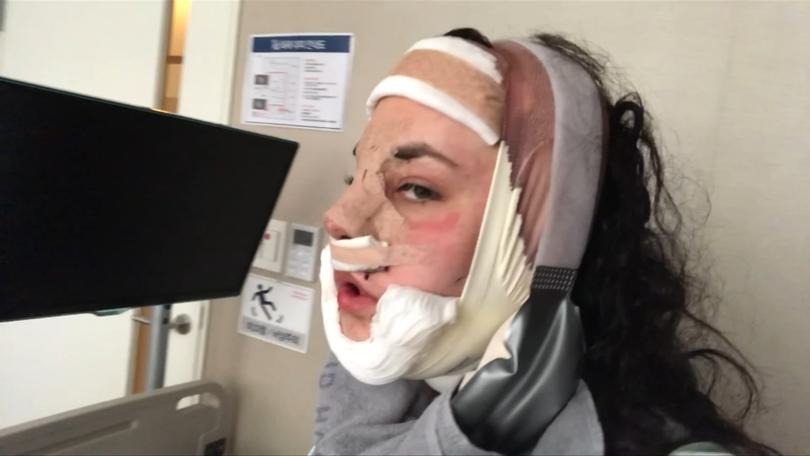Plastic surgeon warns Australians about risks of overseas cosmetic surgery amid rising complications
‘They’re putting themselves at significant risk.’
A plastic surgeon is warning Australians to reconsider having cosmetic surgery overseas, as he revealed how many patients were returning with complications requiring further surgery.
Australian Society of Plastic Surgeons president Dr David Morgan said about six to 10 of his patients a year had experienced complications as a result of an overseas plastic surgery.
WATCH THE VIDEO ABOVE: Doctor’s warning against heading overseas for cosmetic surgery.
Sign up to The Nightly's newsletters.
Get the first look at the digital newspaper, curated daily stories and breaking headlines delivered to your inbox.
By continuing you agree to our Terms and Privacy Policy.“Our members would be seeing them every week … I’m one of about 450 surgeons in the country,” he said.
His advice comes as an Adelaide social media influencer has been appearing in advertisements for a Korean medical tourism agency to promote her plastic surgery.
However, Morgan said going overseas was fraught with risk.
“They’re in a health system they’re unfamiliar with, often with a language barrier that they can’t broach either (so) they’re putting themselves at significant risk,” Morgan said.
For some patients, it takes years to re-book a consultation with an Australian doctor to correct their problems, he said.
“There is that sense of shame and regret that they express when we talk about their experiences (overseas),” Morgan said.

It’s estimated more than 15,000 Australians travel abroad annually to have dental and cosmetic work carried out, despite the associated risks.
While there are no official statistics around outcomes, there are multiple media reports of Australians dying during or shortly after medical procedures overseas.
In 2014, Melbourne man Leigh Aiple died less than 24 hours after returning home from an extreme makeover in Malaysia, The Age reported.
A year later, Gold Coast woman Eva Sarmonikas died from a cardiac arrest during cosmetic surgery in Mexico, the ABC reported.
One of the major driving forces to book an appointment overseas is the price difference of procedures in places such as Turkey, Iran and South Korea.
One clinic in Turkey advertises its procedures as being between 30 and 70 per cent cheaper than the United Kingdom or Australia.
Medical tourism agency, Bookimed said on its website the average cost of a hair transplant in Turkey was between $1500 to $3000, while in Great Britain it’s $5,100 to $6,200.
Influencer travels to South Korea for surgery
Adelaide make-up artist Blake Butler, 26, began travelling overseas for procedures three years after gender transitioning at 18 years old.
When doing her research into plastic surgery, she didn’t feel Australia had many options for gender transition surgery that would help her achieve the look she wanted.
The cost of some procedures was also more expensive, and the wait to get them done was also longer.
Instead, she chose to have surgeries done in South Korea where it is more common for people to get facial feminisation surgery.

Butler struck a business deal to have some of her more recent procedures discounted after her social media videos of her plastic surgery journey amassed 1.4 million views.
“With my first procedure I had done, I had my forehead reduced, my chin and jaw shaved, I had a rhinoplasty, and I had facial liposuction,” Butler said.
“The last surgery I just had, I got a little more facial work done. I got some fat grafting done to my face which added some volume … I also got my breasts done.”
Butler’s first-ever overseas trip was for a major surgery.
She said she was nervous, but she told herself it would be worth it for the results.
She is now considering getting her voice altered.

Morgan said while there were patients who had good experiences, there was also a greater risk of complications that would need further corrective surgery.
The Australasian Society of Aesthetic Plastic Surgeons points out it’s much easier to check the qualifications of Australian practitioners and trust they have been through the highest standard of surgical training.
“If you experience complications after surgery, it is vital that your surgeon and their team are readily available to provide quality aftercare, which may not be the case if you are operated on overseas,” a statement on the website said.
The Australian government introduced guidelines for practitioners of cosmetic surgery and patients in 2023, including a requirement to have a psychological assessment before a procedure, two in-person consultations and a referral from a general practitioner.
Dr Morgan supported the guideline’s introduction, but said it was a “one-size-fits-all” approach that wasn’t suitable for all cases.
He said the unintended consequence was more Australians being attracted to overseas clinics that were able to promote their work through social media and where the process for an appointment was less strenuous.
“They can glamorise the experience and the outcome, and we just simply can’t compete in that space because we’re not allowed to due to these regulations,” Morgan said.
“We would like to see a little more respect for our independence and professional judgement so that there can be differences in the way certain patients are managed, particularly those that might be outside the major cities or have significant difficulties with travelling to see a doctor.”
Butler said the risk of getting surgery so easily was becoming “addicted” and always thinking about what else to change.
She also advised people to do thorough research before booking surgery.
“You don’t want to wind up with any sort of botched surgeries or unhealthy outcomes that you are disappointed with.
“Always trust your gut instinct and make sure where you’re going is a very suitable practice and they have,” she said.
Originally published on 7NEWS
